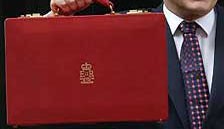The motoring and business highlights of the chancellor's Budget speech.
- Fuel duty will rise in April by just 1p, then by a further 1p in October and again in January rather than all at once in April as planned.
- High speed rail will still go ahead.
- The car scrappage scheme helped boost sales by 30%.
- £100m for repairs to local roads
- £285m for motorway network, including investing in hard-shoulder running.
- New investment bank to be established. It will control £2bn of equity to fund green transport and energy projects.
- "Co-operative approach" to creation of jobs in the motor industry - the Nissan announcement that it will build the electric Leaf car in Sunderland would not have happened without Government help.
- The 50% rate of income tax will come in next month for those earning more than £150,000.
- Those earning more than £100,000 will pay more because some allowances will be removed.
- No other change to VAT, Income Tax or National Insurance.
- £94bn of business loans will be made available next year - half will go to SMEs.
- New service for credit complaints from SMEs
- Extra support for SMEs through the tax system - they have more time to pay and will enjoy reduced rates for fledgling businesses.
- Darling says he will cut business rates for a year from October.
- More help for SMEs to invest in plant and machinery.
- The main rate of Capital Gains Tax will remain unchanged.
Ken Trinder, head of business development at epyx, said: “There is little in the Budget to cheer dealers. They will still be hit with the double whammy of losing the scrappage scheme and the arrival of the so called ‘showroom tax’.
"The bottom line is that 2010 will clearly be a pretty tough year for the motor industry and the onus is very much on dealers to ensure that they are maximising every opportunity that they encounter.”
The other main points of the chancellor's Budget speech
"The task is to bring down borrowing without damaging the economy."
"We will half the deficit in four years."
"This Budget will set a route to long-term prosperity."
"Ecomonic disaster was averted and prospects are much more positive that this time last year."
"But confidence has not fully returned to businesses or consumers."
"Imperative that EU countries act to get European economy going again."
"We intend to get all tax payers' money back" - from selling shares in banks that were bailed out.
£2bn from tax on bank bonuses already taken by the Exchequer.
"We cannot continue with a situation where the banks are rewarded for taking excessive risk."
"Everyone will have a basic bank account - something essential in a modern world."
"The UK economy has contracted by 6% since the start of the crisis."
"If we had watched from the sidelines... we would still be in recession."
"It is clear our approach is making a difference."
"The flexibility of the tax credit system has helped."
"440,000 families have benefited from this extra help."
"Looking at scrapping the default retirement age."
Guaranteed offer of training or work for young people (under 24) if they have been unemployed for more than six months.
"The housing market is stabilised but first time buyers still find it hard to get a mortgage."
The Government will therefore double the stamp duty allowance for first time buyers to £250,000 - funded by an increase in stamp duty for houses over £1m.
ISA limits will rise from £7,200 to £10,200 to encourage saving.
VAT receipts were £3bn higher than expected last year.
Growth predicted to be between 3% and 3.5% next year - lower than originally forecast.
Borrowing this year will be £11bn lower. In 2010/11 borrowing will be £163bn - 11.8% of GDP. Borrowing will be lower than forecast through to 2014.
The Government intends to reduce borrowing by £78bn over next three years.
Increases on duty of cigarettes and alcohol will be as planned.
Cider will have a major 10% above inflation rise in duty.
Tobacco duty will increase from tonight at 1% above inflation.
2.2% real-terms increase in spending next year.
"We must maintain front-line services."
"Reductions in pay bill for civil servants."
The next spending settlement, from 2011 onwards, will be "the toughest for decades".
"Need to identify savings across all services in the public sector - this will be tough."
Will relocate civil servants out of London. 15,000 posts to be moved within five years.
"We can't take growth for granted."
"Working to find effective ways for small businesses to grow."
"Access to credit is still an issue."
"We need to ensure that viable SMEs get the credit they need."














Login to comment
Comments
No comments have been made yet.